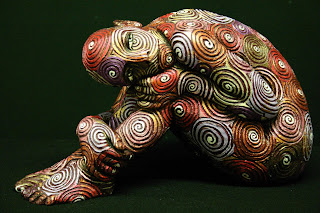A reader follows a plot by the changes that occur
in a character’s life. If their aim is to find the lost treasure of the Incas,
then how the situation develops—if they seem to be getting closer or further
from the goal—will be the primary way to tell how things are progressing.
Changes in the physical world indicate that people
are acting in order to realise their goals. If the scenario remains static,
then you have no plot.
But as things change in the physical world, they
have an effect on the character instigating them. If things are going well, if
things are going badly, if outside forces are getting involved—all these
variables not only change the external situation, they also change the
character internally.
If Billy Joe ask Tammy Jane to the prom and she
says no, that isn’t just a setback requiring a new approach, it will also
change Billy Joe’s emotional frame of mind.
Plot isn’t just about trying various paths until
the character finds the right one, it is also about how a character handles the
journey. In fact, while the external stuff keeps the intellect engaged, it’s
the internal stuff that keeps a grip on readers’ emotions.
Even though most stories show a change in a
character as they make realisations and have moments of insight, these often
get shoved into the end section of a book. But change is rarely only a single
moment of epiphany. Smaller shifts are happening all the time.
When Billy Joe gets a big fat ‘No’ from Tammy Jane,
how it affects him will depend on how she said it and what kind of person he
is. Both characters will be affected by the encounter. Billy Joe might be
horribly embarrassed or angry or depressed. What it won’t do is have no effect
other than him having to find another date.
This change in the character will also affect how
they deal with other things and other people in their life.
Rather than the bad guy always being hated, the
best friend always being asked for advice and the girl across the hall being
flirted with, whatever happens to a character in pursuit of their main goal
will have a knock on effect that allow for a broader range of interactions.
As long as the reader can see the link between
cause and effect it won’t seem out of character, it will make the characters
seem more three dimensional. Their behaviour is a result of what just happened,
repercussions of what they tried to do, what they now have to deal with—in
other words the plot. And what they do next will be informed by their current
state of mind.
Along with the physical changes that mark where we
are in the plot, these character changes also show the reader how things are
progressing. In fact it’s these changes that reveal the kind of person we’re
reading about and allow the reader to connect with the character on a much
deeper level.
If you found this post useful, please give it a retweet. Cheers.








































































































10 comments:
If an event has no real effect on the character, then it doesn't really need to be in the book, does it?
@sarah - it's not just that it should have an effect on the character, that effect needs to be communicated to the reader, hopefully in a way that impacts both them and the rest of the story.
"Plot isn’t just about trying various paths until the character finds the right one, it is also about how a character handles the journey." That is so true! Thanks for the reminder.
Happy reading and writing! from Laura Marcella @ Wavy Lines
Excellent and insightful post, as usual!
Unfortunately, lately I've been reading stories where the (usually YA or romance hero) MC deals with the rejection through narrative. Pretty much: I can't believe this girl/guy didn't fall for me immediately, cuz I've been in love with him/her since I first met him/her and he/she doesn't really know I exist. I know, I'll dress and act like popular people and he/she'll love me.
I need "affect" to be deeper than asthetic, or a crisis situation.
.......dhole
"Plot isn’t just about trying various paths until the character finds the right one, it is also about how a character handles the journey." What a lovely description for a plot. I believe in the cause and effect phenomenon, I also feel that everything should have a reason else it will come across as an add-on event in the story.
@Laura - you're very welcome.
@Heath - thanks!
@Donna - YA readers tend to like simplistic wish fulfillment so that kind of premise sells.
@Rachna - I think sometimes writers try to convince themselves since not everything in life makes sense fiction doesn't have to either, but usually this is based in not being able to come up with any good ideas.
change is what makes the characters interesting.
George R.R. Martin is a master of this. I love how Jaime and Tyrion Lannister have changed over the course of the books. I think it is one of the essential traits to playing "the game of thrones." If you aren't willing to adapt and change, you die.
@Lynda - change and plenty of it.
@Michael - I wish more writers would do that. usually it tends to be a massive change just at the end of the story.